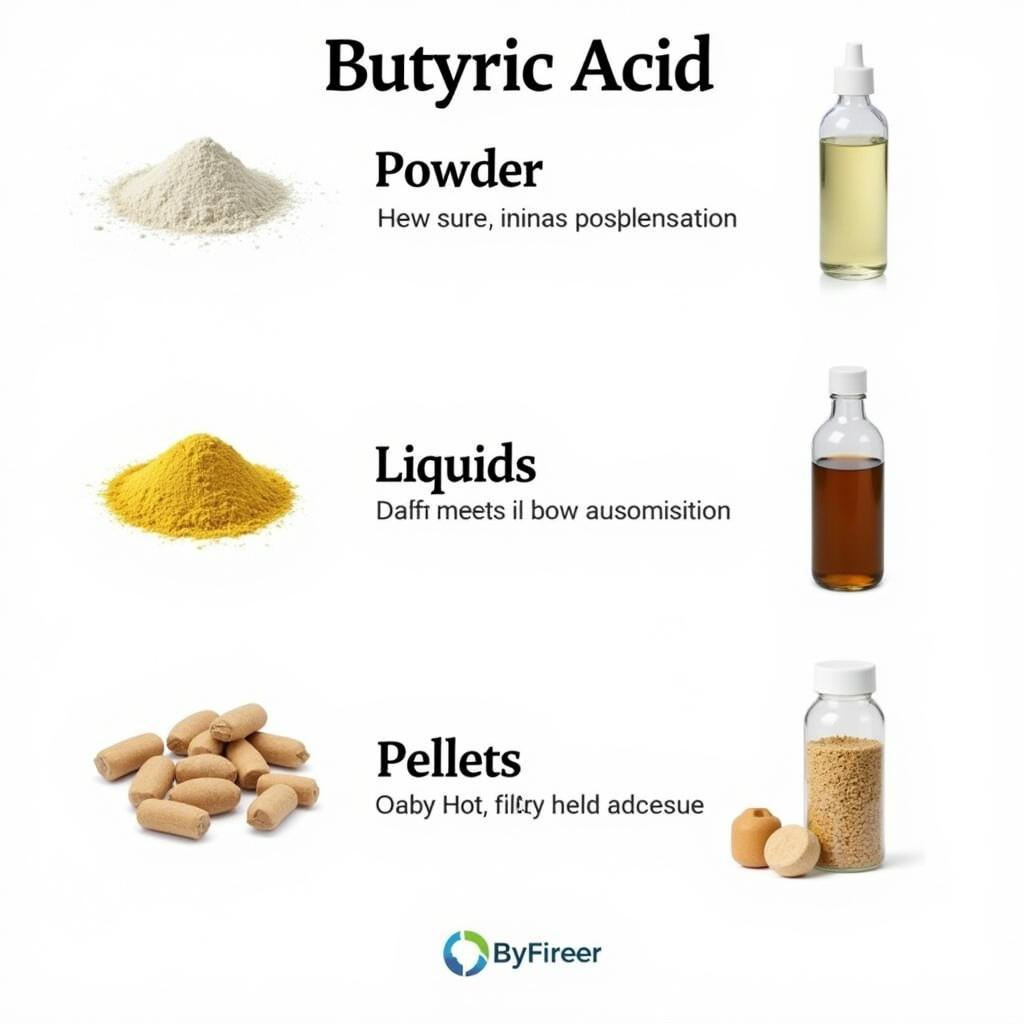Butyric acid supplements for horses are gaining popularity for their potential benefits in supporting digestive health. This article delves into the science behind butyric acid, its role in equine digestion, and how to choose the right supplement for your horse. We’ll also address common questions and concerns surrounding the use of these supplements.
Understanding Butyric Acid and Its Benefits
Butyric acid is a short-chain fatty acid (SCFA) produced in the horse’s hindgut through the fermentation of fiber. It serves as the primary energy source for the cells lining the large intestine, promoting a healthy gut environment. A deficiency in butyric acid can lead to various digestive issues, including inflammation, reduced nutrient absorption, and an increased risk of colic and diarrhea.
Supplemental butyric acid can help replenish these levels and support optimal gut health. Key benefits of butyric acid supplementation include:
- Improved Nutrient Absorption: Butyric acid enhances the integrity of the intestinal lining, allowing for more efficient absorption of vital nutrients from feed.
- Reduced Inflammation: It possesses anti-inflammatory properties, helping to soothe and protect the gut lining from irritation.
- Enhanced Gut Motility: Butyric acid can promote healthy gut motility, aiding in the regular passage of food and waste.
- Support for Beneficial Gut Bacteria: It can foster a favorable environment for the growth of beneficial bacteria, contributing to a balanced gut microbiome.
Choosing the Right Butyric Acid Supplement
Not all butyric acid supplements are created equal. Several factors influence the efficacy of a supplement, including the form of butyric acid used and its delivery method.
 Different Forms of Butyric Acid Supplements
Different Forms of Butyric Acid Supplements
Types of Butyric Acid Supplements
- Sodium Butyrate: This is a common form of butyric acid supplement, readily absorbed in the small intestine.
- Calcium Butyrate: Similar to sodium butyrate, it provides a source of calcium in addition to butyric acid.
- Tributyrin: This is a triglyceride form of butyric acid that is released more slowly in the hindgut, potentially providing more sustained benefits.
- Encapsulated Butyric Acid: Microencapsulation protects butyric acid from degradation in the stomach, allowing it to reach the hindgut where it’s needed most.
What to Look for in a Supplement
- Quality Ingredients: Choose supplements from reputable manufacturers that prioritize quality ingredients and manufacturing processes.
- Proper Dosage: Follow the recommended dosage instructions carefully, as excessive butyric acid can cause digestive upset.
- Palatability: Some horses may be sensitive to the taste or smell of certain supplements. Consider palatable options to ensure your horse readily consumes the supplement.
- Best Horse Calming Supplement While not directly related to butyric acid, a calming supplement can be beneficial for horses experiencing digestive stress.
When to Consider Butyric Acid Supplementation
Several situations may warrant the use of butyric acid supplements, including:
- Changes in Diet: Introducing new feeds or transitioning between forage types can disrupt the gut microbiome and benefit from butyric acid supplementation.
- Stressful Events: Transport, competition, or changes in environment can stress the digestive system, making supplementation beneficial.
- Antibiotic Use: Antibiotics can negatively impact the gut microbiome, and butyric acid can help restore balance.
- Digestive Issues: Horses experiencing colic, diarrhea, or other digestive problems may benefit from butyric acid’s supportive properties.
“Butyric acid is a crucial nutrient for maintaining equine gut health,” explains Dr. Emily Carter, DVM, specializing in equine nutrition. “Supplementation can be a valuable tool in supporting digestive function, especially during times of stress or dietary changes.” Adding, “Always consult with your veterinarian to determine the appropriate dosage and supplement type for your horse’s individual needs.”
Conclusion
Butyric acid supplements can be a valuable addition to a horse’s diet, providing essential support for digestive health. By understanding the different types of supplements available and choosing a high-quality product, you can help ensure your horse receives the full benefits of butyric acid. Remember to consult with your veterinarian to determine if butyric acid supplementation is right for your horse.
FAQ
- How long does it take to see results from butyric acid supplementation?
- Can butyric acid be used alongside other digestive supplements?
- Are there any side effects associated with butyric acid supplementation?
- Is butyric acid safe for pregnant mares and foals?
- How should butyric acid supplements be stored?
- Can I oversupplement my horse with butyric acid?
- What are the signs of a butyric acid deficiency in horses?
“In my experience, incorporating butyric acid into a horse’s diet can significantly improve overall digestive function,” states Dr. Sarah Mitchell, PhD, Equine Nutritionist. “It’s a simple yet effective way to support a healthy gut.”
For further information, explore related articles on our website such as Best Horse Calming Supplement.
When you need assistance, please contact us at Phone Number: 0772127271, Email: [email protected] or visit us at QGM2+WX2, Vị Trung, Vị Thuỷ, Hậu Giang, Việt Nam. We have a 24/7 customer support team.